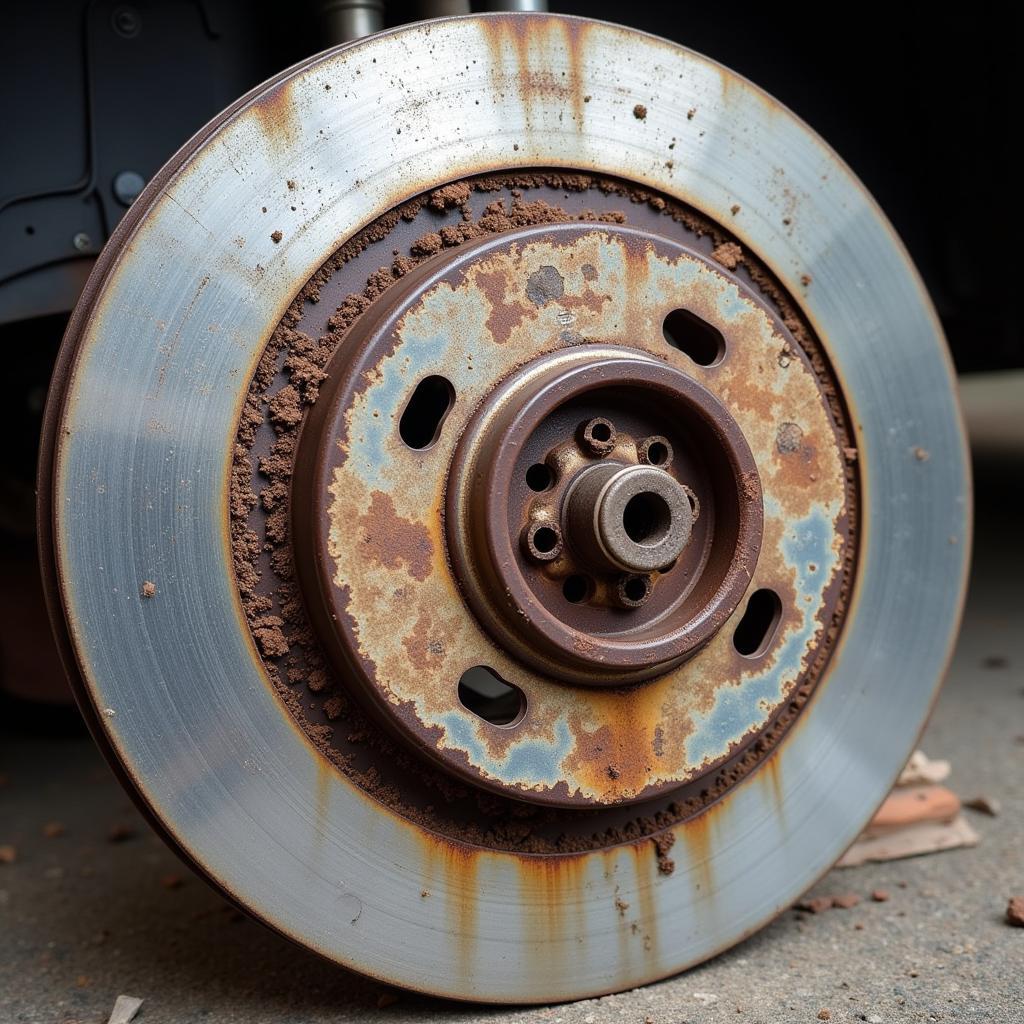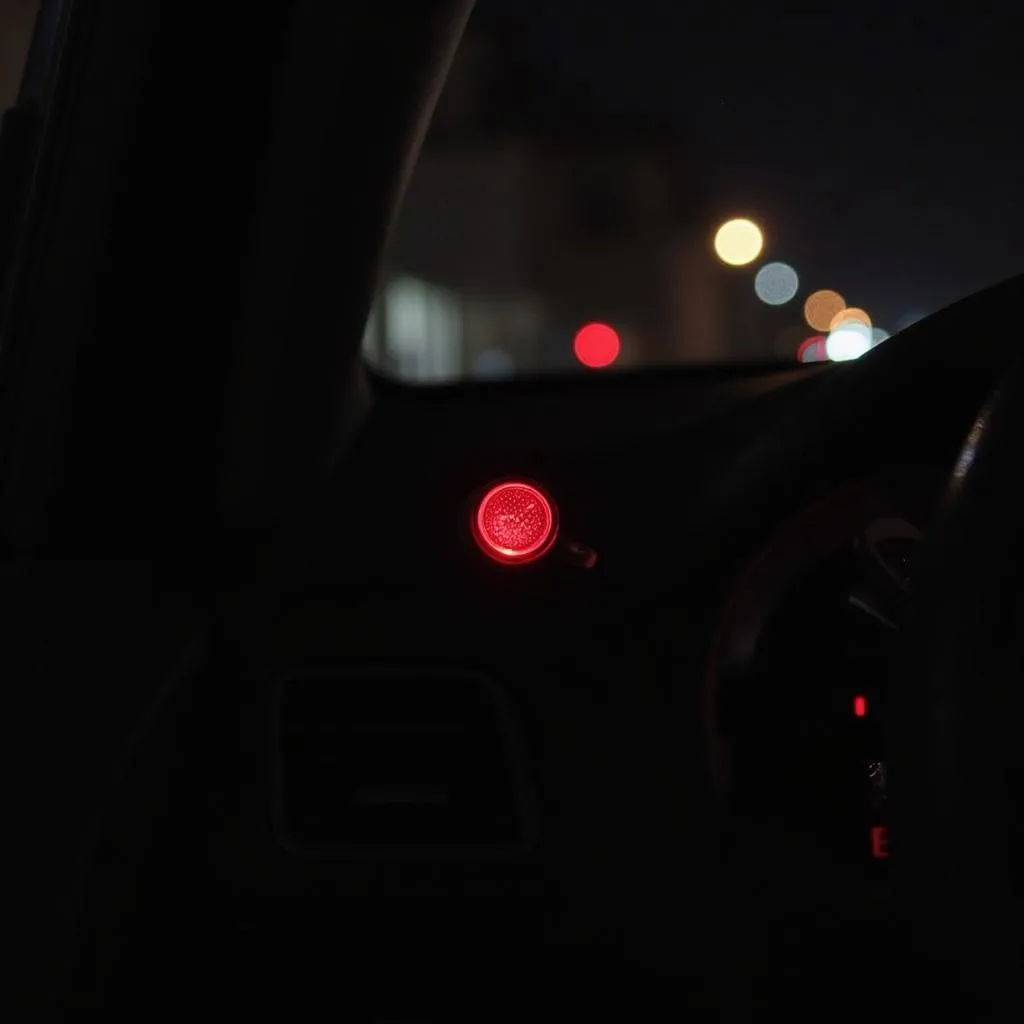Hearing a warning noise coming from your disc brakes can be alarming. This sound, often described as squealing, grinding, or scraping, indicates a potential issue with your braking system that shouldn’t be ignored. As an expert in automotive electrical engineering specializing in remote diagnostics, programming, and software installation, I’m here to help you understand the common causes of these noises and guide you toward effective solutions.
Common Causes of Disc Brake Noise
Several factors can lead to your disc brakes making noise. Identifying the root cause is crucial for effective repair.
1. Worn Brake Pads
The most common culprit behind brake noise is worn brake pads. As you apply the brakes, the pads clamp down on the brake rotors to slow or stop your vehicle. Over time, the friction material on the pads wears down. If it wears thin enough, a small metal indicator will contact the rotor, creating a high-pitched squealing sound – a clear warning sign that your pads need replacing.
2. Glazed Brake Pads
Excessive heat caused by hard braking or riding the brakes can cause the pad material to overheat and harden, resulting in a glazed surface. This glazed surface doesn’t grip the rotors as effectively, leading to reduced braking performance and a loud squealing noise when braking.
3. Dirty or Rusted Rotors
 Dirty Brake Rotor
Dirty Brake Rotor
Over time, brake rotors can accumulate rust, dirt, and debris, especially if the vehicle sits unused for extended periods. These contaminants can interfere with the contact between the brake pads and rotors, causing grinding or scraping noises during braking.
4. Caliper Issues
The caliper houses the brake pads and pistons. If the caliper isn’t functioning properly – for example, a sticking caliper piston – it can cause uneven pad wear and result in noise.
What to Do When You Hear Warning Noises
If you hear any unusual noises coming from your disc brakes, follow these steps:
- Don’t ignore the noise. Continuing to drive with noisy brakes can worsen the issue and potentially lead to more expensive repairs.
- Identify the type of noise. Is it a squealing, grinding, or scraping sound? Knowing the specific sound helps narrow down the potential causes.
- Inspect your brakes. If you’re comfortable doing so, visually inspect your brake pads and rotors for signs of wear, damage, or contamination.
- Consult a qualified mechanic. For a proper diagnosis and repair, it’s best to consult a qualified mechanic, especially if you’re not comfortable working on your car’s braking system.
Can Remote Diagnostics Help?
Advancements in automotive technology have opened up new possibilities for diagnosing car problems remotely. While remote diagnostics might not be able to physically fix your brakes, it can be an incredibly helpful tool:
- Pinpointing the Issue: Remote diagnostics can analyze your car’s computer system to identify the potential source of the brake noise.
- Saving Time and Money: By getting a preliminary diagnosis remotely, you might avoid unnecessary trips to the mechanic and potentially save on diagnostic fees.
- Informed Decision Making: With insights from remote diagnostics, you can make informed decisions about the necessary repairs.
Addressing Brake Noise: Prevention and Maintenance
While some brake wear is inevitable, proper maintenance can significantly extend the life of your brakes and prevent premature wear:
- Regular Brake Inspections: Have your brakes inspected at least once a year, or more frequently if you drive in demanding conditions.
- Brake Fluid Flush: Brake fluid is hygroscopic, meaning it absorbs moisture over time. Have your brake fluid flushed according to your manufacturer’s recommendations to maintain optimal braking performance.
- Quality Brake Pads and Rotors: Using high-quality brake pads and rotors can contribute to longer lifespan and better performance.
Conclusion
Don’t ignore warning noises coming from your disc brakes. Addressing these issues promptly ensures your safety and prevents more costly repairs down the line. Modern solutions like remote diagnostics offer an additional layer of convenience and control, empowering you to make informed decisions about your vehicle’s maintenance. For complex issues, remember that a qualified mechanic is your best resource for a safe and effective repair.
FAQs
Q: What’s the difference between squealing and grinding brake noises?
A: Squealing usually indicates worn brake pads, while grinding suggests metal-on-metal contact, possibly from extremely worn pads or damaged rotors.
Q: Can I drive with noisy brakes for a short while?
A: It’s best to address brake noises immediately. Driving with faulty brakes compromises your safety and could lead to more extensive damage.
Q: How often should I replace my brake pads?
A: Brake pad lifespan varies, but they typically last between 30,000 to 50,000 miles. Consult your owner’s manual or a mechanic for specific recommendations.
Q: Are there any warning lights on the dashboard for brake problems?
A: Yes, if your brake fluid is low or there’s an issue with your ABS system, a warning light will illuminate on your dashboard.
Q: Can remote diagnostics fix my brake problems?
A: While remote diagnostics can diagnose the issue, it cannot physically fix your brakes. A qualified mechanic is needed for the repair itself.

